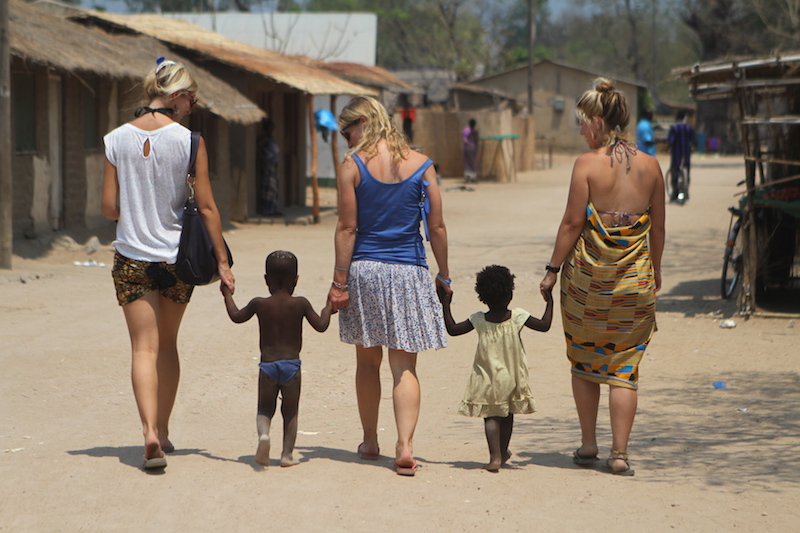5 Tips to Consider Before Volunteering in Africa

My name is Lauren and I’ve been incredibly lucky to find myself working for various responsible tourism organizations. I’m currently in Malawi but have helped to monitor, market and participate in volunteer opportunities for conservation and development initiatives throughout southern Africa. Although my experience is in Africa, these tips will help you when considering opportunities anywhere in the world.
The colorful African continent has an immense amount to offer any traveler or conservationist. In fact, there are many organizations that will help you to find an incredible hands-on experience. If you have the financial means or the appropriate training, you can go out and help tag leopards, dehorn rhinos and research African penguins. In local villages you can coach soccer, teach HIV awareness or plant trees critical for environmental survival.
In Africa, “voluntourism” and “safari conservation” are hotly contested. So, here are five items to consider as you search for reputable volunteer programs and opportunities in Africa.
5 Tips to Consider Before Volunteering in Africa
1. What skills do I have to offer?
In my experience, I’ve learned that a great way to volunteer abroad without paying is to offer the skills you already have in exchange for housing/meals. For example, in Malawi I started contacting organizations that I thought may be able to use my background in marketing, as well as my connections in the US student travel industry.
Marketing, fundraising and accounting/finance expertise are often sought-after skills in the developing world. There are many local organizations that are willing to set-up some sort of exchange – this (as in my case) can turn into a more permanent position.
Think…where do I want to go and what can I do to help this organization achieve their overarching goals?
2. Focus on your passion
Don’t be afraid to approach a conservation or community organization directly about volunteering in Africa. If there is a cause or wildlife species that you are particularly passionate about, a dedicated charity or non-profit may be able to point you in the right direction. For example, I was fascinated by the rhino-poaching crisis, so I looked for a local organization that could point me in the right direction.
This is how I learned about opportunities to work at facilities specializing in infant rhino rehabilitation and to join a horseback anti-poaching team. Finding specialists in the field took some digging, but in the end I was confident that my time and energy had been spent positively.

3. It’s OK to pay
Alternatively, I have paid to volunteer when I had no related experience. This allowed the local organization (rhino rehabilitation center) to cover the costs of my training and housing so that they could continue to devote resources to larger efforts. I felt good about this decision because, ultimately, I did not want to be a burden.
Another benefit of paying an agent is the support services offered. It is never worth compromising your feeling of personal safety in order to get a cheap trip. When I was younger and not 100% comfortable traveling on my own, I was grateful that my volunteer program assisted me in emergencies and provided all domestic transportation.
Also, I contacted previous participants to learn about their experiences. Social media is a great tool and made this quite easy.
I’ve learned that each program provider acts as an agent and is essentially selling a trip. This doesn’t mean paying to volunteer is a scam; but understand that this is a holiday with a twist. In 2-12 weeks I didn’t change the world or defeat the rhino-poaching crisis. Still, I learned a ton, got my hands dirty and had a very meaningful holiday.
Speak the local language, keep an open mind and realize that this experience is, in fact, a journey.
4. Stay for as long as possible
Whenever I travel, my continual regret is that I can’t stay long enough. I wholeheartedly believe that the longer you are able to stay, the more you will gain from the experience. Most organizations require a 2-week stay on-site, and if you are working with children or a community, it is critical that you stay for at least a month.
This is related to studies on the long-term development of children in vulnerable situations. Without reliable adults present in their lives, the potential negative impacts of continual short-term relationships with foreigners can be deeply harmful.
5. Look for local impact
Through working with fair trade tourism operators I learned the absolute necessity of hiring land-trained local staff.
However you decide to volunteer, opt for an organization that hires locals who are certified and trained. Many large volunteer projects hire (often unpaid) international staff to manage operations on-site. It’s important to think about how your presence is playing into the larger economy and perpetuating colonial systems.
In order to promote long-term sustainability, communities need to be trained and educated in wildlife, environmental and cultural conservation. Jobs will never be available as long as trained foreigners are willing to come do these jobs for free.
So what now?
In Swahili the word “Safari” means to take a journey. So, learn from my experiences–go, volunteer and have personal experiences with these unbelievable creatures, people and cultures. Speak the local language, keep an open mind and realize that this experience is, in fact, a journey.
5 Tips to Consider Before Volunteering in Africa Related Reading
So, You Wanna Teach English Abroad?
Have you volunteered in Africa? How was your trip? Email us at [email protected] for information about sharing your experience and advice with the Pink Pangea community. We can’t wait to hear from you.
Photo credits for 5 Tips to Consider Before Volunteering in Africa by Lauren Locke and Unsplash.









Good to know!